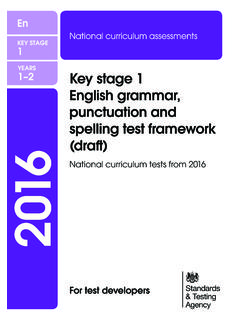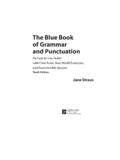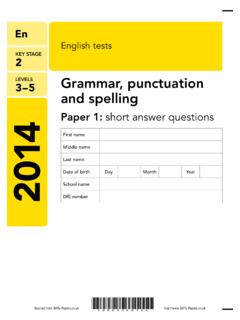Transcription of Grammar, Punctuation and Spelling Year 6
1 Year 6 Long Term PlanGrammar, Punctuation and Spelling , Punctuation and Spelling Year 6 Long Term Plan Classroom Secrets Limited 2018 All Rights ReservedYear 6 Yearly OverviewWeek 1 Week 2 Week 3 Week 4 Week 5 Week 6 Week 7 Week 8 Week 9 Week 10 Week 11 Week 12 Autumn1. Ready to Write2. Synonyms and Antonyms3. Word Classes4. Subjunctive FormAssessmentsSpring1. Punctuation 12. Active and Passive3. Formal and Informal4. Punctuation 25. HyphensAssessmentsSummerRevisionAssessme nts (SATs)1. Cohesion2. Consolidation(Key Stage 2) , Punctuation and Spelling Year 6 Yearly Overview Classroom Secrets Limited 2018 All Rights ReservedTeaching InformationThis scheme of work has been designed to be used in conjunction with your English writing curriculum.
2 We recommend spreading the small steps out over the number of weeks suggested on the yearly overview. It is important to develop and build pupils grammar , Punctuation and Spelling knowledge alongside reading and writing as this is the foundation of the English language. Understanding these elements of the English language enables pupils to not only enjoy English as a subject in its own right, but also to access the rest of the subjects within the whole curriculum. Each block will develop English language fluency as well as application and reasoning to allow children to use these skills across all subject areas. We have provided some notes and guidance for each small step which breaks down the expectations for each pupil, as well as focused questions to help support your teaching.
3 Every step within each block has corresponding resources available on our website. These resources include a Teaching PowerPoint, Varied Fluency questions, and Reasoning and Application questions. The resources for each first step in every block are available to download for free. , Punctuation and Spelling Year 6 Long Term Plan Classroom Secrets Limited 2018 All Rights ReservedWeek 1 Week 2 Week 3 Week 4 Week 5 Week 6 Week 7 Week 8 Week 9 Week 10 Week 11 Week 12 Autumn1. Ready to Write( )Using relative clauses beginning with who, which, where, when, whose, that or with an implied (ieomitted) relative pronoun( )Using modal verbs to indicate degrees of possibility( )Indicating degrees of possibility using modal verbs [for example, might, should, will, must]( )Using adverbs to indicate degrees of possibility( )Indicating degrees of possibility using adverbs [for example, perhaps, surely]( )Using brackets, dashes or commas to indicate parenthesis( )Using expanded noun phrases to convey complicated information concisely( )Using the perfect form of verbs to mark relationships of time and cause( )
4 Using commas to clarify meaning or avoid ambiguity in writing2. Synonyms and Antonyms( )How words are related by meaning as synonyms and antonyms [for example, big, large, little]Terminology for pupils: ( )synonym ( )antonym3. Word ClassesTerminology for pupils: ( )subject ( )object4. Subjunctive Form( )Recognising vocabulary and structures that is appropriate for formal speech and writing, including subjunctive forms( )The difference between vocabulary typical of informal speech and vocabulary appropriate for formal speech and writing [for example, find out discover; ask for request; go in enter]( )The difference between structures typical of informal speech and structures appropriate for formal speech and writing [for example, the use of question tags:He s your friend, isn t he?]
5 , orthe use of subjunctive forms such asIfI wereorWere theyto comein some very formal writing and speech]( )Recognising subjunctive formsAssessmentsYear 6 Long Term Plan Autumn , Punctuation and Spelling Year 6 Long Term Plan Classroom Secrets Limited 2018 All Rights ReservedWeek 1 Week 2 Week 3 Week 4 Week 5 Week 6 Week 7 Week 8 Week 9 Week 10 Week 11 Week 12 Spring1. Punctuation 1( )Using a colon to introduce a list( )Use of the colon to introduce a list( )Use of semi-colons within lists( )Punctuating bullet points consistently( ) Punctuation of bullet points to list informationTerminology for pupils: ( )colon ( )semi-colon ( )bullet points2. Active and Passive( )Using passive verbs to affect the presentation of information in a sentence( )Use of the passive to affect the presentation of information in a sentence [for example,I broke the window in the greenhouseversusThe window in the greenhouse was broken (by me)]Terminology for pupils: ( )active ( )passive3.
6 Formal and Informal( )Recognising vocabulary and structures that is appropriate for formal speech and writing, including subjunctive forms( )The difference between vocabulary typical of informal speech and vocabulary appropriate for formal speech and writing [for example, find out discover; ask for request; go in enter]( )The difference between structures typical of informal speech and structures appropriate for formal speech and writing [for example, the use of question tags:He s your friend, isn t he?, orthe use of subjunctive forms such asIfI wereorWere theyto comein some very formal writing and speech]4. Punctuation 2( )Using semi-colons to mark boundaries between independent clauses( )Using colons to mark boundaries between independent clauses( )Using dashes to mark boundaries between independent clauses( )Use of the semi-colon to mark the boundary between independent clauses [for example, It s raining; I m fed up]( )Use of the colon to mark the boundary between independent clauses( )Use of the dash to mark the boundary between independent clausesTerminology for pupils: ( )colon ( )semi-colon5.
7 Hyphens( )Using hyphens to avoid ambiguity( )How hyphens can be used to avoid ambiguity [for example,man eating sharkversusman-eating shark, orrecoverversusre-cover]Terminology for pupils: ( )hyphenAssessmentsYear 6 Long Term Plan , Punctuation and Spelling Year 6 Long Term Plan Classroom Secrets Limited 2018 All Rights ReservedWeek 1 Week 2 Week 3 Week 4 Week 5 Week 6 Week 7 Week 8 Week 9 Week 10 Week 11 Week 12 SummerRevisionAssessments (SATs)1. CohesionLinking ideas across paragraphs using a wider range of cohesive devices: repetition of a word or phrase, grammatical connections [for example, the use of adverbials such ason the other hand,in contrast, oras a consequence], and ellipsisLayout devices [for example, headings, sub-headings, columns, bullets, or tables, to structure text]Terminology for pupils: Ellipsis2.
8 Consolidation(Key Stage 2)Coverage of all KS2 grammar , Vocabulary and Punctuation 6 Long Term Plan , Punctuation and Spelling Year 6 Long Term Plan Classroom Secrets Limited 2018 All Rights Reserv









